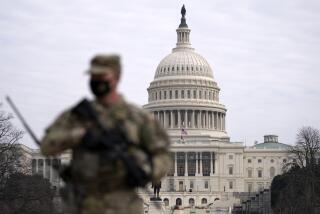Kaifu Drops Effort to Send Troops : Japan: Attempt to pass enabling legislation runs into strong opposition in Parliament and from the public.
- Share via
TOKYO — Bowing to vehement opposition in Parliament and stubborn resistance from the public, Prime Minister Toshiki Kaifu on Friday formally abandoned his attempt to pass legislation that would have allowed Japan to send troops abroad for the first time since World War II.
The move, widely anticipated for several days, virtually ruled out any possibility of Japan’s making a significant contribution of manpower to the multinational peacekeeping effort in the Persian Gulf.
It also may signal an abrupt reversal in fortunes for Kaifu, a comparatively weak prime minister who failed to bridge sharp differences of opinion--even within his own ruling Liberal Democratic Party--during weeks of intense debate over constitutional and legal constraints on Japan’s military.
Japan, which obtains roughly 70% of its oil from the Middle East, has joined sanctions against Iraq, pledged $2 billion in economic aid for disadvantaged gulf states and earmarked another $2 billion toward support for the U.S.-led military operation in the region. Yet it has come under severe criticism in the United States for not putting Japanese lives at risk in safeguarding its national interests in the gulf.
Kaifu proposed his United Nations Peace Cooperation Bill to establish a legal framework for dispatching Self-Defense Forces units to trouble spots like the gulf, where U.N. sanctions are in effect. The overwhelming weight of opinion here is that the postwar “peace constitution,” which American occupiers dictated to a defeated Japan after World War II, forbids overseas deployment of troops.
Although the U.N. Peace Cooperation Corps was to be noncombatant, the right wing of the ruling party demanded that its members be allowed to wear military uniforms and carry weapons for self-defense.
But opposition lawmakers charged that the corps would circumvent the constitutional ban on the use of force to settle international disputes. And mothers took to the streets, demonstrating against the potential for having their sons sent to war.
The ruling party could have easily rammed the bill through the lower house of Parliament before the current session ends today, but opposition control in the upper house would have prevented it from becoming law. Indeed, the death of the Peace Cooperation Bill marked the first time the opposition has used its strength in the upper chamber, since gaining a majority last year, to shape policy on a major issue.
The ruling party reached an accord with two of the moderate opposition parties, the Komeito, or Clean Government Party, and the Democratic Socialist Party, to develop new legislation for a peacekeeping force--without participation by the military.
“A general consensus has been reached on the point that Japan should contribute to the solution of international problems, not only by the means of money but also personnel,” said Misoji Sakamoto, chief Cabinet secretary and spokesman for the Kaifu administration. “This consensus is a significant first step forward in extending this debate among the people.”
The aborted bill, Sakamoto said, helped focus attention on the question of what Japan’s “way of life” should be “as a nation which believes in the principles of human dignity, freedom and democracy.”
Taizo Watanabe, spokesman for the Foreign Ministry, said no details are available yet on how the new non-military peacekeeping corps might be designed.
“It’s only today we’ve decided to give up efforts to pass this bill,” Watanabe said. “We need to start from scratch again.”
The soonest that debate could resume on an alternative bill would be early December, when Parliament is expected to reconvene.
One of the biggest challenges ahead may be finding volunteers who might enlist in an unarmed peacekeeping force.
More to Read
Sign up for Essential California
The most important California stories and recommendations in your inbox every morning.
You may occasionally receive promotional content from the Los Angeles Times.













